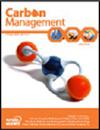Could volatile cryptocurrency stimulate systemic risks in the energy sector? Evidence from novel connectedness models
IF 3.2
4区 环境科学与生态学
Q3 ENVIRONMENTAL SCIENCES
引用次数: 1
Abstract
Abstract By identifying the connectedness of seven indicators from January 1, 2019, to June 13, 2022, we choose an extended joint connectedness approach to a vector autoregression model with time-varying parameter (TVP-VAR) to analyze interlinkages between Crypto Volatility (CV) and Energy Volatility (EV). Our findings show that the COVID-19 outbreak seems to have an impact on the dynamic connectedness of the whole system, which peaks at about 60% toward the end of 2019. According to net total directional connectedness over a quantile, throughout the 2020–2022 timeframe, natural gas and crude oil are net shock transmitters, while the CV, clean energy, solar energy, and green bonds consistently receive all other indicators. Specifically, pairwise connectedness indicates that the CV appears to be a net transmitter of shocks to all energy indicators before the COVID-19 outbreak but acts as a net receiver of shocks from clean energy, wind energy, and green bonds in late 2020. The CV mostly has spillover effects on green bonds. The primary net transmitter of shocks to the Crypto market is crude oil. Our findings are critical in helping investors and authorities design the most effective policies to lessen the vulnerabilities of these indicators and reduce the spread of risk or uncertainty.动荡的加密货币会刺激能源行业的系统性风险吗?新颖连通性模型的证据
本文章由计算机程序翻译,如有差异,请以英文原文为准。
求助全文
约1分钟内获得全文
求助全文
来源期刊

Carbon Management
ENVIRONMENTAL SCIENCES-
CiteScore
5.80
自引率
3.20%
发文量
35
期刊介绍:
Carbon Management is a scholarly peer-reviewed forum for insights from the diverse array of disciplines that enhance our understanding of carbon dioxide and other GHG interactions – from biology, ecology, chemistry and engineering to law, policy, economics and sociology.
The core aim of Carbon Management is it to examine the options and mechanisms for mitigating the causes and impacts of climate change, which includes mechanisms for reducing emissions and enhancing the removal of GHGs from the atmosphere, as well as metrics used to measure performance of options and mechanisms resulting from international treaties, domestic policies, local regulations, environmental markets, technologies, industrial efforts and consumer choices.
One key aim of the journal is to catalyse intellectual debate in an inclusive and scientific manner on the practical work of policy implementation related to the long-term effort of managing our global GHG emissions and impacts. Decisions made in the near future will have profound impacts on the global climate and biosphere. Carbon Management delivers research findings in an accessible format to inform decisions in the fields of research, education, management and environmental policy.
 求助内容:
求助内容: 应助结果提醒方式:
应助结果提醒方式:


